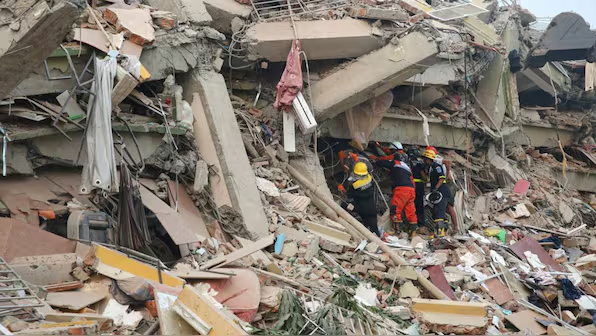News Flash

YANGON, April 16, 2025 (BSS/AFP) - Heavy rains have lashed the Myanmar region stricken by last month's earthquake, aid officials said Wednesday, drenching homeless survivors and bogging down relief efforts.
Some 60,000 people are living in tent encampments in central Myanmar, according to the UN, three weeks after a 7.7-magnitude tremor damaged and destroyed thousands of homes and killed at least 3,700 people.
Downpours around 7:00 pm on Tuesday flooded streets and camps in and around Mandalay, the International Federation of Red Cross and Red Crescent Societies (IFRC) said.
The city -- Myanmar's second most populous -- suffered heavy damage in the March 28 disaster with apartment blocks collapsed, religious institutes demolished and hotels razed by the shallow quake.
AFP journalists in Mandalay over the weekend saw hundreds of people living under plastic gazebos and draped tarpaulins, perched on cardboard in makeshift homes that offered little protection from the elements.
"When these downpours happen the conditions just get really worse," IFRC Myanmar delegation chief Nadia Khoury told AFP.
Myanmar is in the midst of its "Thingyan" festival which typically celebrates the new year with water-splashing rituals symbolising cleansing and renewal.
But celebrations have been muted as the nation mourns, while relief workers and homeless families are fretting over the summer's oncoming monsoon season.
"The conditions are challenging. We are worried about the rains arriving," said Khoury, who has visited the worst affected sites -- where the IFRC is working with the Myanmar Red Cross -- for the past two days.
"This effort needs to be as fast as possible, to get people into some form of permanent shelter, with good sanitary facilities and drinking water."
Myanmar's central belt is blanketed by at least two and a half million tonnes of debris, according to the UN, which says two million people have been pushed into "critical need of assistance and protection".
Many homes remain standing but have suffered cracks, with families too fearful to return as the region is still rattled by regular aftershocks.
Daytime temperatures have soared as high as 44 degrees Celsius (111 degrees Fahrenheit), piling more misery on survivors in the country which is also beset by a brutal civil war following a 2021 coup.